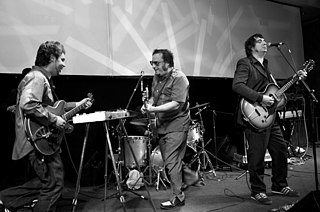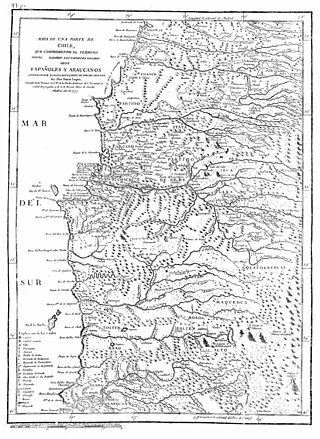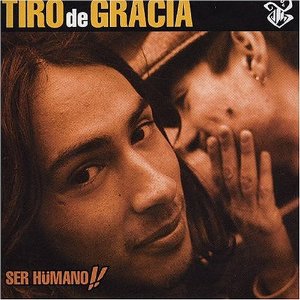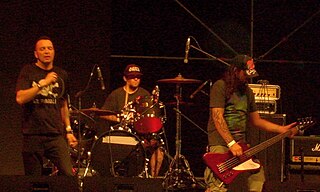
Pedro Gutiérrez de Valdivia or Valdiva was a Spanish conquistador and the first royal governor of Chile. After serving with the Spanish army in Italy and Flanders, he was sent to South America in 1534, where he served as lieutenant under Francisco Pizarro in Peru, acting as his second in command.

Concepción is a city and commune in south-central Chile, and the geographical and demographic core of the Greater Concepción metropolitan area, one of the three major conurbations in the country. It has a significant impact on domestic trade being part of the most heavily industrialized region in the country. It is the seat of the Concepción Province and the capital of the Bío Bío Region. It sits about 500 km south of the nation's capital, Santiago.

Los Tres is a Chilean rock band, formed in 1987 in Concepción by Álvaro Henríquez, Roberto "Titae" Lindl, Francisco Molina and Ángel Parra Jr. They are one of the most influential rock en español bands.
Chilean music refers to all kinds of music developed in Chile, or by Chileans in other countries, from the arrival of the Spanish conquistadors to the modern day. It also includes the native pre-Columbian music from what is today Chilean territory.

The music of El Salvador refers to the Music of the Republic of El Salvador and is encompassed in the wider Latin American musical traditions.
Chilean rock is rock music and its corresponding subgenres produced in Chile or by Chileans. Chilean rock lyrics are usually sung in Spanish so can be considered as part of rock en español, although they are sometimes sung in English as well.
Ruth Fernández was a Puerto Rican contralto and a member of the Puerto Rican Senate. According to the "Comisiones Nacionales para la Celebración del Quinto Centenario" (National Commission for the Celebration of the Fifth Centennial), she is said to be one of three artists whose contributions have helped unite Latin America. The other two artists named were Libertad Lamarque from Argentina and Pedro Vargas from Mexico.

Club Unión Española S.A.D.P. is a professional football club based in the Independencia neighborhood, commune of Santiago, Chile. They currently participate in the Primera División de Chile. It has a branch of women's football, and competes in national tournaments with its lower categories. Acclaimed as one of the four great of Chilean football, it is one of the longest-lived teams in the country.

The Arauco War was a long-running conflict between colonial Spaniards and the Mapuche people, mostly fought in the Araucanía region of Chile. The conflict began at first as a reaction to the Spanish conquerors attempting to establish cities and force Mapuches into servitude. It subsequently evolved over time into phases comprising drawn-out sieges, slave-hunting expeditions, pillaging raids, punitive expeditions, and renewed Spanish attempts to secure lost territories. Abduction of women and war rape was common on both sides.

Club de Deportes Santiago Wanderers is a football club based in Valparaíso, a founding member of the Chilean Football Federation. Their home ground, Estadio Elías Figueroa Brander, is in the north-west of the city. Wanderers have played their games there since 1931 after moving from Barrio Puerto.

Soda Stereo was an Argentine rock band formed in Buenos Aires in 1982. The band's membership consisted of singer-guitarist Gustavo Cerati, bassist Zeta Bosio and drummer Charly Alberti. During their career, the band released seven studio albums before disbanding in 1997. Soda Stereo is the best-selling Argentine band of all time, having sold seven million records by 2007.

Los Ángeles Negros are a Chilean pop ballad band formed in San Carlos de Chile in 1968. The band's best-known line-up consisted of singer Germaín de la Fuente, guitarist Mario Gutiérrez, keyboardist Jorge González, bassist Miguel Ángel "Nano" Concha, and drummer Luis Ortiz. Their music is a blend of boleros, psychedelic funk and rock music, known as Balada rockmántica.

Anamaría Tijoux Merino, commonly known by her stage name Ana Tijoux or Anita Tijoux, is a French-born Chilean musician. Her music contains political and popular themes. She became famous in Latin America as the MC of hip hop band Makiza during the late 1990s. In 2006, she crossed over to the mainstream of Latin pop after her collaboration with Mexican singer Julieta Venegas in the radio hit "Eres para mí". She gained more widespread recognition following her second solo album, 1977, and later with La bala (2011) and Vengo (2014) which brought her a Best Artist of the year award in the 2015 Pulsar Awards.
Tiro de Gracia was a Chilean Hip-Hop group formed by the MC's: Lenwa Dura and Zaturno
Immigration to Chile has contributed to the demographics and the history of this South American nation. Chile is a country whose inhabitants are mainly of Iberian, mostly of Andalusian and Basque origin, and Native American, mostly descended from Mapuche peoples. A moderate numbers of European immigrants settled in Chile during the 19th and 20th centuries, mainly Spanish, as well as Germans, British, French, Southern Slavs, and Italians who have made additional contributions to the racial complex of Chile. However, this immigration was never in a large scale, contrasting with mass migrations that characterized Argentina, Uruguay and southern Brazil, and therefore, anthropologically, its impact with lesser consequence. At the same time, some separate cultural aspects, such as German cakes, British afternoon tea, and Italian pasta, were preserved. The fusion is also visible in the architecture of Chilean cities. This intermarriage and mixture of cultures and races have shaped the present society and culture of Chile.
The first annual Altazor Awards 2000 took place on March 30, 2000, at the Teatro Municipal de Santiago. The nominees were announced on March 20.

Ser Humano!! is the debut studio album by Chilean hip-hop group Tiro de Gracia, released in 1997 through EMI Odeon. It was produced by Camilo Cintolesi and Patricio "Adonai" Loaiza, both members of the group, and Gaston "Cenzi" Gabarro, member of Chilean hip-hop group Makiza, the album features appearances from Camilo "Tea Time" Castaldi and Cristian "C-Funk" Moraga from Chilean band Los Tetas, Pedro Foncea, Quique Neira, Ema Pinto and Joe Vasconcellos. The project was recorded at Kostantinopla Studios in Santiago, owned by Carlos Cabezas from the band Electrodomésticos. The cover features a close-up to the faces of Juan Sativo and Lenwa Dura, and was taken by Sebastián Domínguez, manager of Makiza.

Fiskales Ad-Hok are a punk band from Santiago de Chile, formed in the late '80s. Its initial lineup consisted of Alvaro España on vocals, Roly Urzúa on bass, "Polo" on drums, "Cyril" on guitar and "Pogo"- who would go on to become the lead singer of his own band Los Peores de Chile – on guitar and vocals. Their album Fiesta was included in the list of the 50 greatest Chilean albums according to Rolling Stone (Chile).

Fiesta is the debut solo album by Chilean singer-songwriter Denise Rosenthal. It was available for physical release in Chile on November 6, 2013 via FeriaMix Santiago. On November 8, 2013, the album was available to purchase digitally in iTunes in the United States, Chile, and the rest of Latin America. Rosenthal released the album under the stage name, "D-Niss".

Patricia Paola Fernández Silanes, better known as Nona Fernández, is a Chilean actress, author, and screenwriter. She is a recipient of the Sor Juana Inés de la Cruz Prize, and the Altazor prize.













